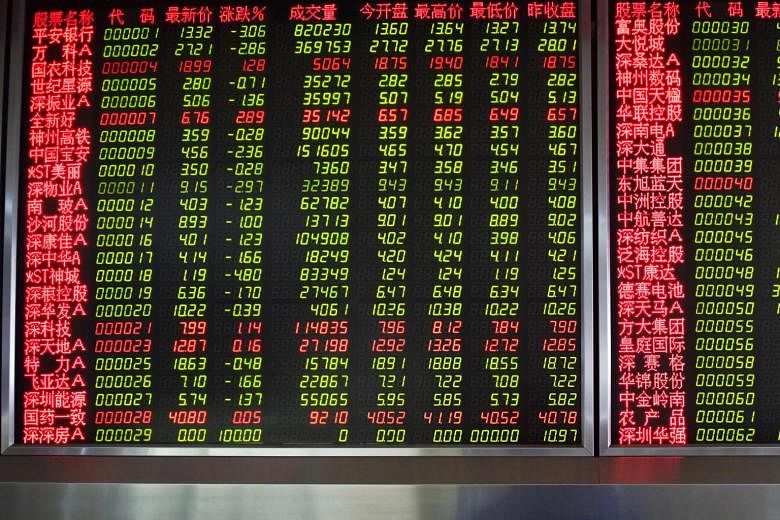SHANGHAI (REUTERS) - Asian stocks stumbled on Friday (Oct 18) after China posted its weakest growth in nearly three decades, countering a global lift in sentiment on the UK and European Union striking a long-awaited Brexit deal.
China's economy grew 6.0 per cent in the third quarter, less than expected, and the weakest pace in at least 27-1/2 years, as the US-China trade war hit demand at home and abroad. While the downbeat data raises the prospect that Chinese policymakers could prepare more measures to boost growth, analysts and market players said Beijing has relatively little room for significant easing.
"How much traction is monetary policy going to get? If there is any short-term move (higher) here in Asia it will genuinely be only short-term players because we're not far from printing 5 (percent) in China GDP, and that's not going to be good for risk assets," said Greg McKenna, strategist at McKenna Macro.
"It doesn't matter how excited you get about stimulus, it is not going to be good for risk assets."
MSCI's broadest index of Asia-Pacific shares outside Japan was down 0.17 per cent by 0350 GMT, erasing earlier small gains. Australian shares dropped 0.61 per cent and Chinese blue-chips were off 0.65 per cent.
Singapore's Straits Times Index also turned negative, heading down 11.41 points or 0.36 per cent to 3,114.68 at 12pm.
The disappointing Chinese data came as Japan's core inflation slowed to near 2-1/2-year lows in September, raising expectations that the Bank of Japan could add to its already massive monetary stimulus.
Japan's Nikkei was last up 0.18 per cent.
The pound, which had enjoyed its biggest rising streak since October 1985 and hit a five-month high on the back of the Brexit deal, gave up ground on Friday morning amid doubts that the agreement would receive parliamentary approval. The pound eased 0.31 per cent to buy US$1.2848.
"Whatever was agreed last night with the EU still has to go through the British parliament...the uncertainty surrounding that still hasn't changed one iota," said James McGlew, executive director of corporate stockbroking at Argonaut in Perth, Australia.
Equity markets had enjoyed a bounce on Thursday from the initial Brexit news, with the S&P 500 briefly topping 3,000 points for the first time in more than three weeks.
Helping to alleviate immediate trade war worries, China said on Thursday that it hoped to reach a phased agreement in its trade dispute with the United States as soon as possible.
Investors were also encouraged by upbeat earnings from Netflix and Morgan Stanley, but poor results from International Business Machines Corp and weak US economic data weighed.
Housing starts, industrial production and mid-Atlantic factory output all fell short of economist expectations.
The Dow Jones Industrial Average gained 0.09 per cent to 27,025.88, the S&P 500 finished up 0.28 per cent at 2,997.97 and the Nasdaq Composite rose 0.4 per cent to 8,156.85.
On Friday, S&P 500 e-mini stock futures, were down 0.16 per cent at 2,993.25.
Reflecting the cautious mood, the yield on benchmark 10-year Treasury notes fell to 1.7395 per cent compared with a US close of 1.755 per cent on Thursday.
In the currency market, the safe-haven yen strengthened, with the dollar falling 0.1 per cent to 108.54, while the euro was up 0.04 per cent on the day at US$1.1126.
The dollar index, which tracks the greenback against a basket of six major rivals, was barely lower at 97.592.
Oil fell, with US crude dropping 0.17 per cent to US$53.84 a barrel and Brent crude easing 0.45 per cent to US$59.64 per cent.
Spot gold rose to US$1,492.54 per ounce.

